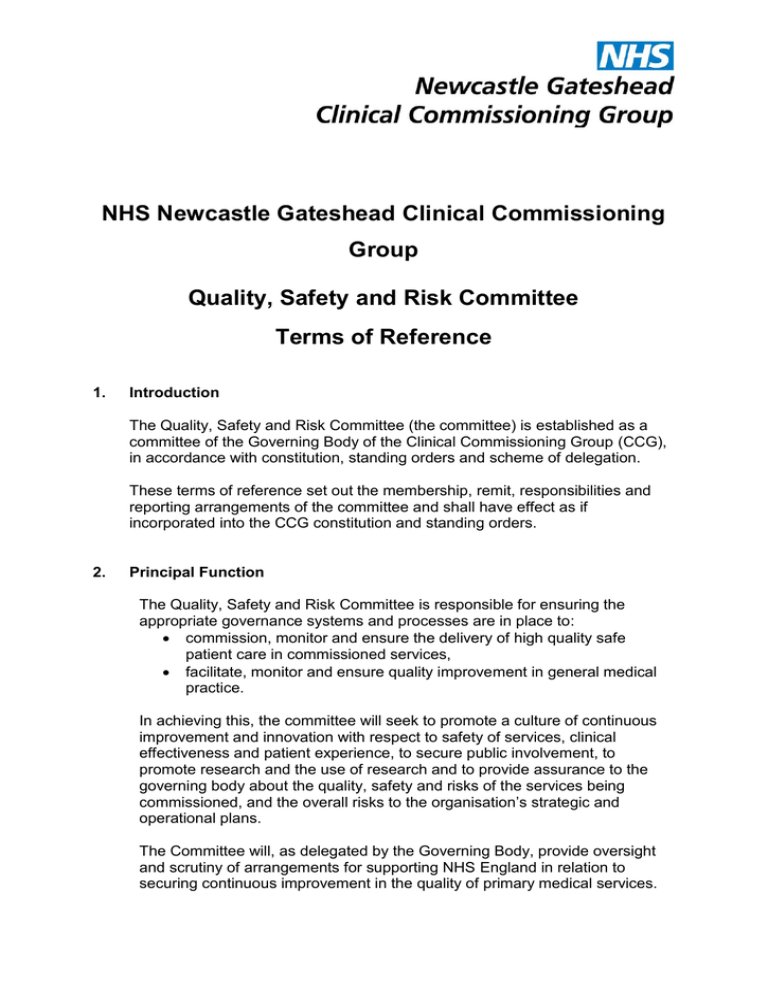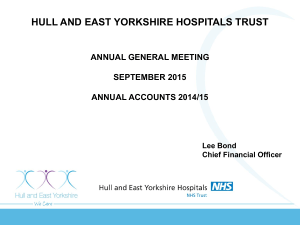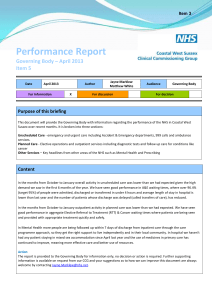Quality, safety and risk committee terms of reference
advertisement

NHS Newcastle Gateshead Clinical Commissioning Group Quality, Safety and Risk Committee Terms of Reference 1. Introduction The Quality, Safety and Risk Committee (the committee) is established as a committee of the Governing Body of the Clinical Commissioning Group (CCG), in accordance with constitution, standing orders and scheme of delegation. These terms of reference set out the membership, remit, responsibilities and reporting arrangements of the committee and shall have effect as if incorporated into the CCG constitution and standing orders. 2. Principal Function The Quality, Safety and Risk Committee is responsible for ensuring the appropriate governance systems and processes are in place to: commission, monitor and ensure the delivery of high quality safe patient care in commissioned services, facilitate, monitor and ensure quality improvement in general medical practice. In achieving this, the committee will seek to promote a culture of continuous improvement and innovation with respect to safety of services, clinical effectiveness and patient experience, to secure public involvement, to promote research and the use of research and to provide assurance to the governing body about the quality, safety and risks of the services being commissioned, and the overall risks to the organisation’s strategic and operational plans. The Committee will, as delegated by the Governing Body, provide oversight and scrutiny of arrangements for supporting NHS England in relation to securing continuous improvement in the quality of primary medical services. The Committee will, as delegated by the Governing Body, approve arrangements for handling complaints, information governance including arrangements for handling Freedom of Information requests, and provide oversight and scrutiny on arrangements for business continuity and emergency planning. 3. Accountability The Quality, Safety and Risk Committee is a Committee of the CCG’s Governing Body. 4. Membership Membership of the Committee will include: A Lay Member (Chair) A Lay Member with responsibility for PPI (Deputy Chair) Medical Director Director of Nursing and Patient Safety Secondary Care Specialist Doctor A clinical representative of each unit of delivery Director of Delivery and Transformation (Gateshead) Director of Delivery and Transformation (Newcastle) Director of Quality Development Head of Corporate Affairs The Chair has the responsibility to ensure that the Committee obtains appropriate advice in the exercise of its functions. Officers, employees, and practice representatives of the CCGs and other appropriate individuals may be invited to attend all or part of meetings of the committee to provide advice or support particular discussion from time to time. 5. Authority 5.1 The Governing Body authorises the Committee to pursue any activity within these Terms of Reference including to: (i) Seek any information it requires from CCG employees, in line with its responsibility under these terms of reference and the Scheme of Reservation and Delegation; (ii) Require all CCG employees to co-operate with any reasonable request made by the Committee, in line with its responsibility under these terms of reference and the Scheme of Reservation and Delegation; (iii) Review and investigate any matter within its remit and grants freedom of access to the organisation’s records, documentation and employees. The Quality, Safety and Risk Committee Terms of Reference v1 May 2015 2 Committee must have due regard to the Information Policies of the CCG, regarding personal health information and the CCG’s duty of care to its employees when exercising its authority. 5.2 In discharging its responsibilities the Committee will comply with the CCG’s Standing Orders and Prime Financial Policies and Conflicts of Interest Policy. 6. Roles and Responsibilities 6.1 Quality in Commissioned Services (scrutiny and validation) 6.1.1 To develop, monitor and review the CCGs vision and framework for commissioning services are high quality, that is safe, clinically effective and provide positive patient/carer experience. 6.1.2 To receive reports on the quality of commissioned services, to review risks arising and monitor progress in implementing recommendations and action plans. 6.1.3 Where the CCG is the coordinating commissioner ensure provision of appropriate quality assurance and improvement information to collaborating CCGs; in particular escalating any areas of concern in timely way. 6.1.4 To receive reports on the quality of commissioned services from other CCGs where they act as the coordinating commissioner and the CCG has contracts. 6.1.5 To seek assurance on the performance of NHS provider organisations in terms of the Care Quality Commission, Monitor and any other regulatory bodies. (Note that the Monitor’s compliance framework relies on assurance from third parties, including local commissioners of services). 6.1.6 To receive and review the draft Quality Accounts of NHS providers where the CCG acts as coordinating commissioner and approve the corroborative statement to the provider within the timescales outlined in the Quality Account Regulations. 6.1.7 To receive and review the published Quality Accounts of NHS Foundation Trusts which, as a minimum, will include those relating to the Foundation Trusts which provide local acute services, community health care services and mental health and learning disabilities services to the Newcastle and Gateshead population. 6.1.8 To oversee the development of quality incentive schemes e.g. CQUIN ensuring alignment to CCG strategic priorities and national requirements. 6.1.9 To ensure a clear escalation process, including appropriate trigger points, is in place to enable appropriate engagement of external bodies in relation to areas of concern, with a view to an external review being carried out. Quality, Safety and Risk Committee Terms of Reference v1 May 2015 3 6.1.10 To ensure appropriate collaboration with the Local Area Team of the NHS CB e.g. through future Local Area Quality Surveillance Group. 6.2 Improving Quality in General Medical Practice 6.2.1 To ensure that agreements and processes in place with the group’s members to secure improvements in the quality of primary medical services in terms of clinical effectiveness, patient safety and patient experience in GP practices. 6.2.2 To ensure an appropriate interface and collaborative working with the NHS Commissioning Board is maintained in relation to quality in general medical practice. 6.3 Patient Safety – Overarching Systems 6.3.1 To receive reports on clinical risks, incident reporting, serious incidents, ‘Never Events’, complaints, claims and safety alerts; and monitor progress in implementing recommendations and action plans. 6.3.2 To oversee development of a Patient Safety Assurance Framework with systems for monitoring quality and safety of care, with reference to a range of indicators which might include Care Quality Commission ratings and reviews, Monitor ratings and any other relevant sources of external assurance. 6.3.3 To receive and scrutinise independent investigation reports relating to patient safety issues and agree publication plans. 6.3.4 To receive reports on the management of infection control performance, especially health care acquired infections. 6.3.5 To receive a Medicines Management Report, not less than annually. 6.3.6 To receive a Controlled Drugs monitoring report, not less than annually. 6.3.7 To ensure that appropriate strategies and training plans are in place for safeguarding of children and vulnerable adults, receiving appropriate reports pertaining to the CCG’s safeguarding duties. 6.4 Patient experience 6.4.1 To ensure that the views of patients and the public are properly reflected in the development and implementation of CCG Policies and Plans and to receive and act upon reports on patient experience. 6.4.2 To oversee the development and implementation of a structured and planned approach to the collection and use of patient reported experience in both Quality, Safety and Risk Committee Terms of Reference v1 May 2015 4 provider management processes and commissioning decisions. To ensure that this approach includes use of feedback from individual consultations in practice. 6.5 Clinical Effectiveness 6.5.1 To promote and encourage an evidence based culture within the CCG and wider health economy ensuring CCG’s commissioning takes account of national guidance such as NICE guidance, NICE quality standards and other relevant standards e.g. from Royal Colleges and professional bodies. 6.5.2 To ensure that the CCG promotes research and the use of research. 6.6 Risk 6.6.1 To ensure that all systems are in place and operating effectively for the identification, assessment and prioritisation of potential risk (including quality and patient safety, financial risk including regarding QIPP, health and safety, emergency preparedness, business continuity, information governance and sustainable development), and to report on any major strategic issues and any associated financial implications to the governing body and to other external agencies as appropriate including the National Reporting and Learning System 6.6.2 To ensure the adequacy of the Board Assurance Framework, using it operationally to guide the work of the committee in gaining assurances on the principal strategic risks identified within the framework. This will include review of the content of the Corporate Risk Register and to scrutinise controls and actions for high and extreme risks. 6. 6.3 To advise and assure the Clinical Commissioning Group on the development of policy, strategy and practice in respect of equality, diversity and human rights (supported through the Equality Delivery System), including the Equality Diversity and Human Rights Annual Report to ensure the statutory and legal obligations of the CCG are met. 7. Administration The Governing Body Secretary will ensure that a minute of the meeting is taken and provide appropriate support to the Chair and Committee members. 8. Quorum The quorum shall be one third of the membership of the committee, including at least one Lay Member and one clinical member (doctor or nurse). In the event that a meeting of the committee is not quorate, the Chair can decide that the meeting will progress, but where decisions are required they will Quality, Safety and Risk Committee Terms of Reference v1 May 2015 5 be deferred to the next meeting when the committee is quorate. 9. Decision Making The individual members will have delegated authority from their respective CCGs to make decisions with regard to matters relating to their own CCG, as set out within the CCG’s scheme of delegation. Generally it is expected that decisions will be reached by consensus. Should this not be possible then a view of members will be required. In the case of an equal vote, the person presiding (i.e. the Chair of the meeting) will have a second, and casting vote. 10. Frequency and notice of meetings Meetings will be held at such interval as the Chair shall judge necessary to discharge the responsibilities of the Committee, but shall be at least six times per year. 11. Attendance at meetings 11.1 The members of the Committee are required to provide information to progress and inform the agreed agenda items. 11.2 The Committee members are required to attend each meeting or if apologies are made any information they are expected to contribute must be supported either through a deputy or in writing to the Chair. 11.3 In addition to the core membership the Committee may co-opt additional members as appropriate to enable it to undertake its role. 12. Reporting Arrangements The minutes of the meetings shall be formally recorded and submitted to the Governing Body. The Chair of the committee shall draw to the attention of the Governing Body any issues that require disclosure to the Governing Body, or require executive action. The committee will report to the Governing Body, at least annually on its work. 13. Conduct of the committee All members of the committee and participants in its meetings will comply with the Standards of Business Conduct for NHS Staff, the NHS Code of Conduct Quality, Safety and Risk Committee Terms of Reference v1 May 2015 6 and the CCG’s Policy on Standards of Business Conduct and Declarations of Interest which incorporate the Nolan Principles. 14. Date of Review The committee will review its performance, membership and these Terms of Reference at least once per financial year. It will make recommendations for any resulting changes to these Terms of Reference to the Governing Body for approval. No changes to these Terms of Reference will be effective unless and until they are agreed by the Governing Body. Approval Date: 12 May 2015 Review Date: April 2016 Quality, Safety and Risk Committee Terms of Reference v1 May 2015 7




